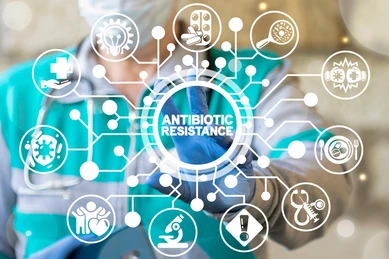What is antibiotic Resistance ?
Antibiotic resistance is also known as drug resistance; it is a term that describes a bacterium’s ability to reach a stage where it becomes immune to antibiotics that should have destroyed the specific bacteria or even inhibited its growth. The most alarming anthropogenic menace in the modern world is the emergence and spread of ‘superbugs’ among infectious microbial communities. Such organisms possess the ability to survive and reproduce even under adverse conditions — the presence of antibiotic drugs within many populations thankfully retains a sizable penetration potential but newer infections are pushing meaning that global primacy for antibiotic use is under threat. Antibiotic resistance can be genetic in nature, which means that the bacteria themselves evolve through natural mutations. Such mutations occur over time leading to structural changes that provide new characteristics of resistance against antibiotics. The android characteristic is the ability of bacteria to acquire additional genes responsible for providing resistance from other vast pools of bacteria. The most prevalent of which are vegetative in nature leading to uncomplicated infections like pneumonia, tuberculosis and urinary tract infections.
A major contributing factor for developing resistance is the over use and mismanagement of antibiotics. A clear factor is ’excessive prescription’ from healthcare professionals or even self-prescription wherein the patient consumes antibiotics without seeking professional help. The situation is worsened further due to the aggressive use of antibiotics within animal husbandry; especially in the cases of prophylaxis or to promote growth. Oftentimes antibiotics are disbanded before treatment or take an incorrect dosage allowing low antibiotic concentrations which put adequate stress to cause selective pressure on the bacterial population to adapt.
Bacterial vectors capable of mediating antibiotic resistance may escape domestication and be expelled into the environment which together only makes the situation worse. For musical structuring, antibiotic resistance genes are pervasive in soil and water and from the treated animals they may reach humans by means of the food chain.
Causes of Antibiotic Resistance
In India, the causes of antimicrobial resistance include:
Overuse of Antibiotics: The easy availability of over-the-counter antibiotics without a prescription results in misuse.
Mismanagement in Healthcare: The Over prescription by healthcare providers is usually caused by ignorance or pressure from patients; this later leads to resistance.
Agricultural Practices: The practice of giving antibiotics to chickens and farm animals to boost their growth plays a part in a loop of pollution that affects food safety and the environment. In India many infections are tied to germs that can fight off drugs, like Klebsiella pneumoniae. This germ often causes infections in hospitals and has learned to resist many common antibiotics, which makes it hard for doctors to treat.
The impact of antibiotic resistance in India is acute. It leads to prolonged illness, escalated treatment cost, and increased risk of mortality among patients. Besides, rising resistance against penicillin antibiotics and other first-line drugs further impairs India’s capability to manage effectively against ordinary bacterial infections.
Challenges in antibiotic resistance
- Threat to Public Health The pandemic of antibiotic resistance is a disease as it reduces available options for treating bacterial infections. Patients suffering from pneumonia, tuberculosis, urinary tract infections, and blood infections become more challenging since they need longer treatment and have higher death rates. Resistant pathogens, for example klebsiella pneumonia infections, are usually incurred at high costs and more toxic therapy.
- Overuse and Misuse of Antibiotics Undoubtedly, antibiotics have been overprescribed which is a significant contributor to the development of drug resistance. Misuse of Antibiotics includes prescriptions that patients obtain for themselves or are prescribed antibiotics for flu and cold viruses despite their ineffectiveness which encourages the development of resistance in bacteria. In farming practice, antibiotic use is high as it increases livestock growth and finds its way into the food and the environment leading to antibacterial drug resistance.
- Rise of Superbugs The term super bugs is used because these are bacterial strains that can conquer a large number of antibiotics and therefore there are limited treatment options for the practitioners if any at all. These pathogens tend to multiply in a very wasteful way in hospitals and communities and cross continental borders making the control of such infections an issue of global concern.
The Role of Pharmacists in India
Professional pharmacists have an appreciable advantage when it comes to addressing the crisis of antibiotic resistance in India. Their contribution is crucial on the frontlines of these critical health concerns of antimicrobial resistance and infection control.
Public Awareness Campaigns
Pharmacists can help patients to appreciate what antibiotic resistance is all about and encourage the completion of antibiotic courses while avoiding self-medication. Campaigns are particularly relevant in rural locations where knowledge levels are very poor.
Promoting Rational Antibiotic Use
Pulled in partnership with physicians, pharmacists also ensure that the correct antibiotics are prescribed in the appropriate dosages only. For instance, they argue that antibiotics should not be administered to somebody suffering from a viral infection like a cold or the flu because it will not work.
Surveillance and Monitoring
Pharmacists in India play an important role in the monitoring of antibiotic consumption and the resistance trends among the strains. This data will be useful in the country’s foothold in the fight against antimicrobial resistance within the context of WHO guidelines.
Improving Access to Infection Control
Pharmacists may advocate for helping to promote the awareness of the importance of proper hygiene, vaccination, and any other known effective strategies that prevent infection. Proper hygiene measures reduce the transmission of drug resistant strains of microorganisms.
Conclusion
India opines a huge challenge of fighting against antibiotic resistance. Superbugs and increasing resistance will undermine the decades’ passage of medical progress. But with an effective role played by pharmacists and a national dedication to fight against antimicrobial resistance, India can manage the spread of drug-resistant bacteria’s spread. With public education, better healthcare practices, and research support, India can preserve antibiotics’ effectiveness for generations to come.








